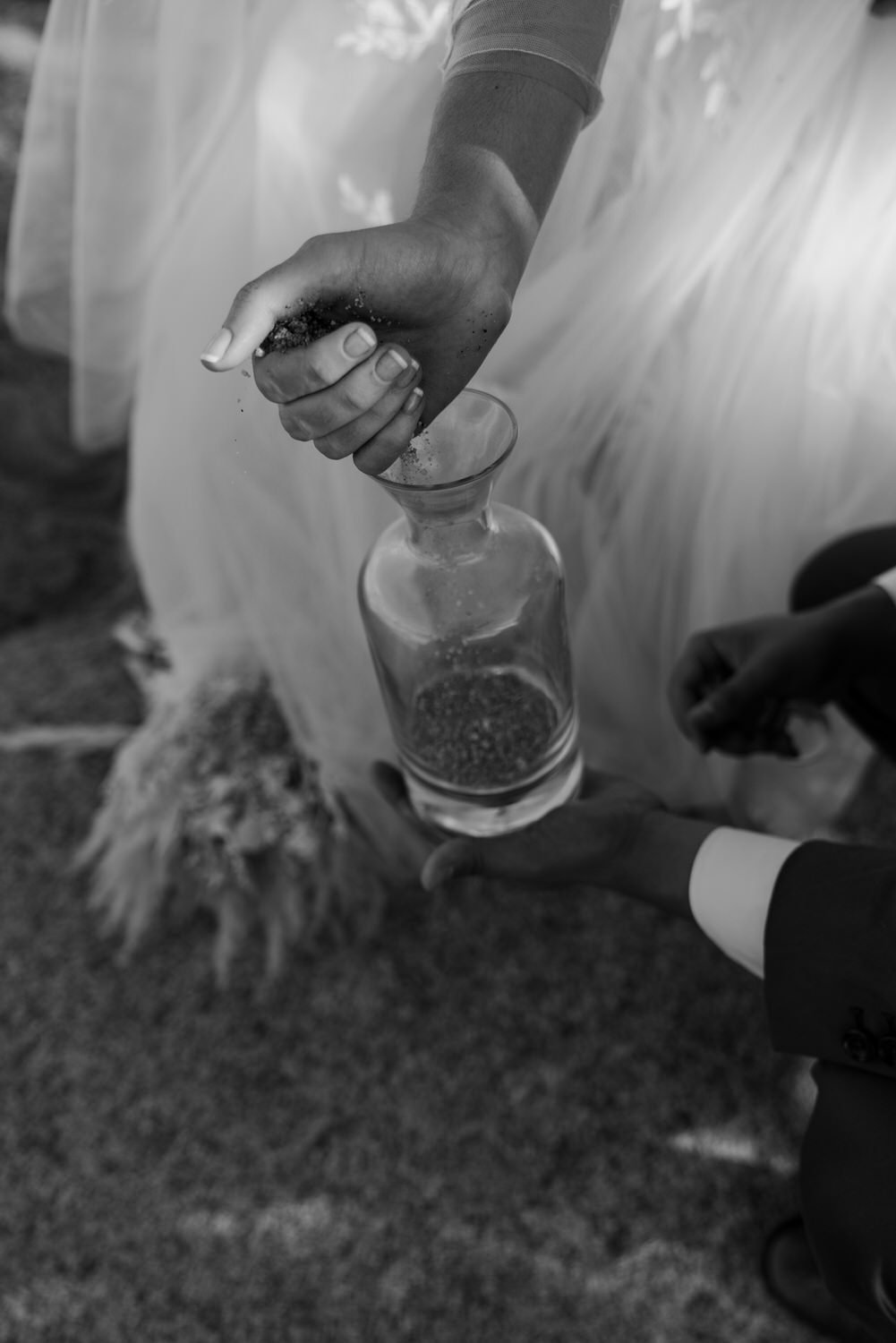How to Actually, Legally, Get Married
This seems like a really basic question that you’re already expected to know the answer to, but the truth is, most people don’t have a clue… Especially if you haven’t already gone through the process before! Honestly, why would you? (I mean, I had no idea what it entailed when I got married… which resulted in a few questionable decisions that I probably wouldn’t make again today.) And if you find yourself asking this question while trying to plan your elopement or wedding, I hope this post helps shed some light on the matter!
First off, let’s get this out of the way — Getting legally married is NOT about having a wedding… or an elopement, for that matter.
Wait… What’s the difference between getting married and having a wedding/elopement?
Getting legally married is simply about declaring your intent to marry each other (oftentimes in front of an ordained officiant and witness) and taking care of some paperwork. Having a wedding or an elopement is about celebrating your union. You don’t have to have a wedding to get legally married, nor do you need to get legally married during your wedding! (Mind blown yet? Keep reading!)
Just to clarify, since I’m based in Southern California, this mostly pertains to getting married in California, although the gist of it would apply to many other US states.
This isn’t me trying to de-romanticize getting married, not at all! I do think, however, that it’s important to understand what exactly is involved so that you can actually build your perfect day around it. So let’s break it down.
What you’ll need to get legally married:
A marriage license. This is the piece of paper that essentially says, “yes, you can get married.” You can apply for a marriage license online and pick it up at a county clerk’s office — the both of you must be present for this. The county clerk will ask you several questions to verify your identity, and will issue you your marriage license on the spot. This license (in California, at least) is then valid for 90 days - meaning, you have to legally get married within 90 days of receiving this piece of paper, and you MUST have this with you at the time of your ceremony.
An officiant. Someone - anyone - who is ordained can do this, as long as they are able to ask you the questions that they are legally obligated to ask. It could be your mom, dad, aunt, distant cousin, best friend… again, as long as they are ordained! They can do so through the Universal Life Church or the American Marriage Ministries. Yes, it’s free, and totally legit! An officiant is required in most states, however there are some states like Colorado where you can self-officiate! There are also certain states that DO NOT recognize ministers ordained online, so make sure to check your own state’s marriage laws to confirm if the person you’ve chosen to officiate is recognized in that state. Did you know that I am an ordained officiant and can help to perform your ceremony? If you’re considering a just-us elopement and need an officiant, ask me about officiating! :)
A witness. In California, all you need is one witness to your ceremony (see below), and this could be anyone at all! I have personally been a witness for my couples who choose to have a just-us elopement with no guests, but you could also have any guest present sign as your witness, or even just a passer-by. Some states do require two witnesses, and in some states (like Colorado), your dog could be your witness! So again, check the marriage laws of the state you want to get married in to make sure you meet all their requirements.
Aaand that’s it! But you probably still have a million questions, because I did too. So let’s break it down further.
First off… What exactly is a ceremony?
If you’ve been to a wedding, you probably know what a ceremony is, or what it has. There’s the processional, the greeting by the officiant, followed by maybe a little story about the couple, the vows, the “I do’s”, the exchange of rings, the first kiss, and the exit. And depending on your culture or religion, there might be other elements involved as well.
But what’s really important for legal purposes is the “I do’s”, aka the declaration of intent. A ceremony need NOT have any other elements to have it be recognized in the eyes of the law. So no, you don’t need a processional, you don’t need a flower girl, you don’t need personal vows, you don’t even need rings if you’d rather exchange something else!
A Unity Sand Ceremony — combining sand from the spot where you exchange your vows.
All the other elements are simply traditions that have been passed down through the generations, and it’s totally up to YOU whether you want to include them or not. They do NOT dictate what makes a marriage legal. You also have a choice to make up your own traditions, or include elements in your ceremony that do mean something to you. Some examples:
Planting a tree together
Singing a song to each other
Exchanging another token in place of rings
Lighting your own unity candle
Getting a tattoo together!
Commitment Ceremonies
There is also what has come to be known as a commitment ceremony. This may NOT involve any legal proceedings, and is mostly symbolic for the both of you. (So no, you wouldn’t need your marriage license, an officiant, or a witness in this case!)
Oftentimes and for various reasons, couples may choose to get the official paperwork out of the way on a separate day, and hold a commitment ceremony at a different time (aka their actual wedding or elopement day!).
In my opinion, a commitment ceremony is not any less important than a legal ceremony because it still solidifies your commitment to each other, the people who matter most in this union. So if you’re wanting to exchange your vows in a different state or country but it would just be easier to take care of the official legalities in your own state, you can absolutely do so in your home state before or after traveling for your commitment ceremony. And no, I promise it doesn’t make your commitment ceremony any less special! This is when you can exchange your personal vows, and incorporate any special elements that matter to you in your own specially-designed ceremony.
A Commitment Ceremony in Joshua Tree National Park
If we don’t have a wedding venue, is the courthouse our only option?
Maybe a better question would be, “Where can we actually get legally married?”
Short answer: ANYWHERE. And no, it doesn’t need to be at the courthouse! Or a traditional wedding venue!
You can get married in a back alley if you wanted! Your own backyard, your own living room... In a parking lot. Heck, even on a plane! As long as it’s clear which state you’re in so that you’re bound by that state’s marriage laws, it really doesn’t matter exactly where in the state you declare your intent to get married.
**Please note that this is only applicable to the US - every country has its own set of rules, so if you’re getting legally married in a different country, please make sure to check that specific country’s rules! For US residents/citizens who want to have an international destination wedding, sometimes it’s just easier to take care of the official stuff in the US before or after traveling.
What a traditional wedding venue offers is the ability to host a large group of people, a place to set up decor and furniture for a ceremony and a reception. If you’re eloping with just the two of you or a handful of guests and don’t want to rent out a whole venue, there are other options besides the courthouse! This is where I, as an elopement photographer, come in. Part of my job involves location scouting for breathtaking places in the outdoors that can accommodate a small group of people for your ceremony. I make it my job to familiarize and research any permits needed to hold a ceremony at any given spot (this could literally be a turn-out on a scenic road, at a trailhead, at a mountain summit, on a lakeshore etc) so that we are all set to gather at that spot.
That said, if you are looking for the easiest, most straightforward option of taking care of the legal side of things, you can absolutely go to the courthouse. In this case, you wouldn’t need to look for a location, an officiant, or even a witness - you can hire one at the courthouse itself! Many people choose to do this if they just want something simple for the legalities, then either hold a wedding or an elopement on a separate date especially if they’re traveling for it (see commitment ceremonies above).
Here’s a quick breakdown of what you need and what is involved for the two different types of ceremonies:
Legal Ceremonies:
Who needs to be involved: You & Your Partner, An Ordained Officiant, 1 Witness
What is needed: Your marriage license
When can you have this: Anytime!
Where can you have this: Anywhere!
How to have it be legally recognized: Declare your intent of getting married to each other (i.e. “I do”) and having an ordained officiant sign your marriage license
Commitment Ceremonies:
Who needs to be involved: You & Your Partner
What is needed: Anything! Rings, a seed to plant a tree together, musical instruments, anything you want to include
When can you do this: Anytime! Before or after your legal ceremony, depending on what makes sense for you!
Where can you have this: Anywhere!
How to have a commitment ceremony: Prepare any elements/traditions you want to include (e.g. exchanging personal vows, exchanging rings, etc).
Okay, now that you have a better understanding of what exactly is involved in getting married, what are your options exactly moving forward? I break it down below:
Option 1: Have a wedding at a traditional wedding venue with an officiant and a witness, and take care of the legal stuff during your actual wedding
Option 2: Elope at a location of your choice, with an officiant and a witness, and take care of the legal stuff during your actual elopement.
Option 3: Legalize it in a courthouse, then plan a wedding/elopement later (or before!)
Option 4: Just elope/have a courthouse ceremony and call it a day.
While there is nothing wrong with Option 4, I hope you choose either one of the first 3 options! Because whether or not you decide to get legally married at a courthouse, your union deserves to be truly celebrated. This day you commit to spend the rest of your lives together is a significant and special day, and a day that should be commemorated. I hope you choose a day filled with activities/experiences that mean something to you, a day that you’ll look back on in later years and say, “I can’t believe this was the way we chose to get married”.
If you need help or ideas on how to make your wedding/elopement day truly special, please reach out!! Or if you have any further questions on what this involves, leave a comment below. <3 I am incredibly passionate about demystifying this process so that you can have a day you truly deserve. And I love nothing more than to show couples the potential your day can have, especially if you’re eloping!


